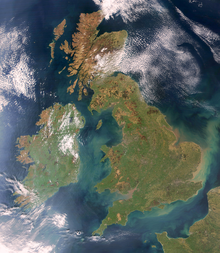| Revision as of 16:00, 27 March 2021 editSantiago Claudio (talk | contribs)Extended confirmed users41,813 editsNo edit summary← Previous edit |
Revision as of 16:02, 27 March 2021 edit undoSantiago Claudio (talk | contribs)Extended confirmed users41,813 editsmNo edit summaryNext edit → |
| Line 8: |
Line 8: |
|
British nationalism's unifying identity descends from the ] who dwelt on the island of ].<ref name="Guntram H. Herb 2008"/> British nationalism grew to include people outside Great Britain, in ], because of the ], which declared that the crown of Ireland was to be held by the ruling monarch of ] as well as ] calls for unity with Britain.<ref>Brendan Bradshaw, Peter Roberts. British Consciousness and Identity: The Making of Britain, 1533-1707. P. 302.</ref> |
|
British nationalism's unifying identity descends from the ] who dwelt on the island of ].<ref name="Guntram H. Herb 2008"/> British nationalism grew to include people outside Great Britain, in ], because of the ], which declared that the crown of Ireland was to be held by the ruling monarch of ] as well as ] calls for unity with Britain.<ref>Brendan Bradshaw, Peter Roberts. British Consciousness and Identity: The Making of Britain, 1533-1707. P. 302.</ref> |
|
|
|
|
|
It is characterised as a "powerful but ambivalent force in British politics".<ref>{{harvnb|Smith|Smith|White|1988|p=61}}.</ref> In its moderate form, British nationalism has been a ], emphasizing both cohesion and diversity of the people of the United Kingdom, its dependencies, and its former colonies.{{sfn|Motyl|2001|pp=64}} However, ] nationalism has arisen based on fear of Britain being swamped by immigrants; this ] nativist nationalism has manifested politically in the ] and other nativist nationalist movements.{{sfn|Motyl|2001|pp=64}} Politicians, such as former ] ], have sought to promote British nationalism as a progressive cause.<ref>Conservative Party leader David Cameron advocates liberal or civic British nationalism: {{cite web |quote=Being British is one of the most successful examples of inclusive civic nationalism in the world. |title=http://www.conservatives.com/News/Speeches/2006/09/Cameron_I_will_never_take_Scotland_for_granted.aspx |title=Cameron: I will never take Scotland for granted |archive-url=https://web.archive.org/web/20120924062357/http://www.conservatives.com/News/Speeches/2006/09/Cameron_I_will_never_take_Scotland_for_granted.aspx |archive-date=24 September 2012 |website=Conservatives |date=15 September 2006}} The Party's official party site</ref> |
|
It is characterised as a "powerful but ambivalent force in British politics".<ref>{{harvnb|Smith|Smith|White|1988|p=61}}.</ref> In its moderate form, British nationalism has been a ], emphasizing both cohesion and diversity of the people of the United Kingdom, its dependencies, and its former colonies.{{sfn|Motyl|2001|pp=64}} However, ] nationalism has arisen based on fear of Britain being swamped by immigrants; this ] nativist nationalism has manifested politically in the ] and other nativist nationalist movements.{{sfn|Motyl|2001|pp=64}} Politicians, such as former ] ], have sought to promote British nationalism as a progressive cause.<ref>Conservative Party leader David Cameron advocates liberal or civic British nationalism: {{cite web |quote=Being British is one of the most successful examples of inclusive civic nationalism in the world. |title=Cameron: I will never take Scotland for granted |url=http://www.conservatives.com/News/Speeches/2006/09/Cameron_I_will_never_take_Scotland_for_granted.aspx |archive-url=https://web.archive.org/web/20120924062357/http://www.conservatives.com/News/Speeches/2006/09/Cameron_I_will_never_take_Scotland_for_granted.aspx |archive-date=24 September 2012 |website=Conservatives |date=15 September 2006}} The party's official party site.</ref> |
|
|
|
|
|
==Nationalism and unionism== |
|
==Nationalism and unionism== |
| Line 14: |
Line 14: |
|
|
|
|
|
==List of British nationalist parties== |
|
==List of British nationalist parties== |
|
* ], formerly Brexit Party |
|
* British Commonwealth Party |
|
* ] |
|
* ] |
|
* ] |
|
* ] |
| Line 21: |
Line 21: |
|
* ] |
|
* ] |
|
* ] |
|
* ] |
|
* ] |
|
* ] |
|
|
* ], formerly Brexit Party |
|
* ] |
|
* ] |
|
* ] |
|
|
|
|
|
|
==See also== |
|
==See also== |
It is characterised as a "powerful but ambivalent force in British politics". In its moderate form, British nationalism has been a civic nationalism, emphasizing both cohesion and diversity of the people of the United Kingdom, its dependencies, and its former colonies. However, nativist nationalism has arisen based on fear of Britain being swamped by immigrants; this anti-immigrant nativist nationalism has manifested politically in the British National Party and other nativist nationalist movements. Politicians, such as former British prime minister David Cameron, have sought to promote British nationalism as a progressive cause.



